Table of Contents
In my many years of biohacking and using nootropics to optimize my brain, I have found basic blood work is fundamental to measuring my success.
Lab tests give me a more accurate window into what these supplements are doing to my body and brain. More so than simply relying on how I feel.
If you’ve been using nootropics for an length of time, you may have wondered how to go further in reaching your biohacking goals. Blood tests and other lab work can go a long way in helping refine your nootropic stack.
Doing blood work on a regular basis, even when you’re not sick, gives you the ability to find out if you’re going in the right direction. Nootropics affect more than just your brain. Supplements affect the rest of your body as well.
Basic blood work will tell you about hormone levels, inflammation, vitamin and minerals levels, and how your organs and glands are doing. This gives you the ability to eliminate the guesswork by getting real data about your body.
If something shows up that’s out of range, you can then take steps to correct it. Often by simply modifying your nootropic stack. You can take a proactive approach and prevent major problems from ever happening.
I highly recommend Lets Get Checked for many of the labs I detail below. You order online, they’ll send you a kit with instructions, and once returned to their lab you’ll get your results in 2 – 3 weeks. Try: Lets Get Checked and use coupon code: nootropics20 for 20% off.
This post is about types of lab work available. And what types of tests you may want to consider.
Lab Tests for Neurohackers
For neurohackers, information provided by blood tests are vital to optimizing both mental and physical performance. You get accurate data on specific biochemistry. And how your body is responding to changes in diet, lifestyle, and the nootropic supplements you’re taking.
Basic bloodwork will give you a window into:
- Inflammation
- Blood health
- Thyroid health
- Vitamin & mineral levels
- Adrenal gland, kidney and liver health
- Hormone health
There is the temptation, especially when you’re early in your neurohacking journey, to go after specialized tests. Like having your neurotransmitters tested. We’ll cover those next.
While the big, basic tests may not be nearly as exciting, they tell you volumes about your body. And overall health. Especially cognitive health.
Neurotransmitter Lab Testing
Our primary goal in brain optimization typically has to do with altering brain chemistry. In fact, studies estimate that 86% of Americans have low neurotransmitter levels.[i]
Sub-optimal neurotransmitter levels are caused by stress, poor diet, neurotoxins, faulty genes, prescription and recreational drugs, alcohol and caffeine.[ii] Sounds like most of us. Right?
So it seems reasonable that we could get a more accurate picture on what’s going on in our brain if we get our neurotransmitter levels tested.
It turns out that most neurotransmitter lab tests are useless. And here’s why…
The least expensive and most common lab test advertised is neurotransmitter urine tests. The problem is that there is nearly zero correlation between neurotransmitter levels in the brain and the rest of your body.
The neurotransmitters in your brain are primarily synthesized in the neurons in your brain. These brain chemicals never make it to your kidneys for urine output.
For example, most of the serotonin in your body is produced in your gut.[iii] And are produced by bacteria. Not neurons.
It’s absolutely true that this serotonin can affect anxiety, depression and overall mood. But this brain-gut connection (which I’ve written about earlier here) cannot be accurately measured by reading levels of serotonin.
Because much of this serotonin goes directly to your kidneys and is excreted in urine. NOT how much serotonin is present in your brain.
The microbiome in your gut manufactures more than 30 neurotransmitters. Including serotonin. Which take care of other bodily functions. But also send messages to your brain. Affecting anxiety, stress, learning and memory, decision-making and depression.[iv]
Measuring neurotransmitter levels in your urine from neurochemicals synthesized in your gut give no indication on what’s going on in your brain.[v]
Another problem with urine testing is the half-life of many of the main neurotransmitter molecules. Serotonin has a half-life of one second.[vi] Others a fraction of a second.
Then you may have issues with damaged, depleted or non-existent neuroreceptors. Or other compounds bound to these receptors rather than the intended neurotransmitter.
One final note on neurotransmitter urine testing. Research has verified that urinary neurotransmitter testing is not an accurate way to test levels in your brain.[vii] And saliva neurotransmitter tests are as unreliable as urine testing.
The only method left is serum or blood testing for neurotransmitters. While this is considered more accurate than urine or saliva testing, it still doesn’t tell us much. Because your neurotransmitter levels vary by the hour and by the day.
But all is not lost because we have other ways to measure our biohacking progress in the lab.
Most Important Lab Tests for Neurohacking
Those of us interested in neuro- and biohacking have found that a basic battery of tests performed at least annually give us a clear picture of our physical and psychological health.
Here we’ll take a brief look at the most common blood tests. And why they matter to your neurohacking success.
CBC Panel (Chemistry & Complete Blood Count)
The blood chemistry panel (CBC) provides a wide range of information about our heart, endocrine (glucose levels), gall bladder and bile ducts and kidney function.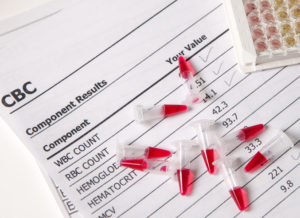
This panel tells you about the presence of anemia, infectious organisms, nutritional deficiencies, lymphatic issues, and blood disorders.
For example, when something is wrong with your blood it will affect your total health. Including brain function. Anemia will cause weakness, fatigue, dizziness and headache.
A problem with your kidneys can show up as low (or high) sodium, potassium and chloride ions. Ion channels and their associated ions directly influence how each of your neurons communicate and use neurotransmitters.
Abnormally low RBC levels could indicate deficiencies in iron, folate, Vitamin B6 and B12. The last three are directly tied to synthesis of most of your major neurotransmitters. And easily corrected with the use of nootropic supplements.
Increased levels of WBCs (lymphocytes, monocytes, neutrophils, eosinophils, and basophils) are typically associated with bacterial, viral, parasitic or protozoal infections. Supplementing with Iodine, St. John’s wort, or Mucuna Pruriens (L-Dopa) can kill bacteria, fungal infections and viruses.
DHEA
DHEA measures your adrenal function. Low levels of DHEA show up as memory loss, depression, Alzheimer’s, chronic inflammation and other problems. Adding DHEA to your nootropic stack may be all you need to improve memory and mood.
Estradiol
This hormone level check is particularly important for aging men, and women after menopause. In men, increased levels of estradiol and decreased levels of testosterone usually indicate low libido and difficulty urinating. Other symptoms include excess fat, brain fog, depression and fatigue.
See my article for more: Sex Hormones and Your Brain
Homocysteine
Excess homocysteine is an important risk factor for heart disease and stroke. Research shows that elevated homocysteine levels in those with depression are a result of too little folate.[viii] Adding Vitamin B6 (Pyridoxine), Vitamin B9 (Folate) and Vitamin B12 to your stack may be all you need to improve mood and bring homocysteine levels down.
C-reactive protein (CRP)
C-reactive protein (CRP) is a very powerful indicator of inflammation both in your body and brain.
Elevated levels of C-reactive protein are implicated in developing type II diabetes,[ix] loss of information processing, recall, and memory ability (even in healthy people),[x] Alzheimer’s and depression.
Here again nootropics come to the rescue. Vitamin B8 (Inositol) and Rhodiola Rosea have been found to repair and prevent damage caused by elevated C-reactive protein and free radicals.
TNF-a, IL-6, IL-1b and IL-8
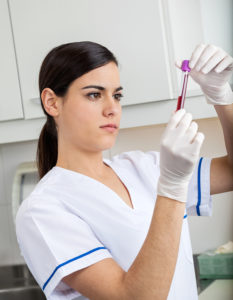 Proinflammatory cytokines tumor necrosis factor-a (TNF-a), interleukin-1 beta (IL-1b), interleukin-6 (IL-6), and interleukin-8 (IL-8) regulate C-reactive protein. And knowing them may help identify the cause of inflammation.
Proinflammatory cytokines tumor necrosis factor-a (TNF-a), interleukin-1 beta (IL-1b), interleukin-6 (IL-6), and interleukin-8 (IL-8) regulate C-reactive protein. And knowing them may help identify the cause of inflammation.
These cytokines are cellular growth factors that are synthesized in nearly every cell in your body. Generally only in response to stress. There is growing evidence that elevated levels of proinflammatory IL-6 could predict your potential for depression.[xi]
Excess proinflammatory cytokines can cause severe inflammation leading to diseases like Alzheimer’s and Parkinson’s. They can deplete neurotransmitters which lead to cognitive decline. And excess cytokines can result in brain fog, anxiety, depression, fatigue, and overall poor mental performance.
Adding Artichoke Extract (Luteolin), Cat’s Claw, Ginseng, L-Glutamine, Oat Straw, SAM-e, Vitamin B3 (Niacin), Vitamin B6 (P-5-P), Vitamin B8 (Inositol), or N-Acetyl L-Cysteine (NAC) to your nootropic stack can keep proinflammatory cytokines under control.
But make sure you review each nootropic article because certain nootropics may only control one or two of these inflammatory cytokines. Find out which ones work for what’s indicated in your blood work.
Folate and Vitamin B12
Vitamin B9 (Folate) and Vitamin B12 are required for the synthesis of the neurotransmitters dopamine, epinephrine, norepinephrine and serotonin.
Deficiencies in both vitamins are due to poor absorption in the gut, pancreatitis, tapeworm, or high alcohol consumption to name a few. Vitamin B12 can only be obtained from food through animal sources. So is a problem for vegetarians and vegans.
Folate deficiency is common in those with problems with the MTHFR gene. This enzyme is needed to convert folic acid and food folate into 5-methylenetetrahydrofolate that your body can use. Up to 60% of people have issues with the MTHFR gene.
Both of these vitamins are easy to check with a blood test. And lacking in either of these vitamins reduces the efficacy of your entire nootropic stack. For a few cents a day you can support the investment you’ve made in your daily stack.
Fasting insulin
Fasting serum insulin is used to measure insulin sensitivity and resistance. Insulin resistance in our modern world is affecting people of every age group.
One study was done at the University of Michigan in 2006 with 4,902 people aged 12 – 19. Weight status was the largest indicator of who was going to be insulin resistant. In this study, the prevalence of insulin resistance in obese kids was 52.1%.[xii]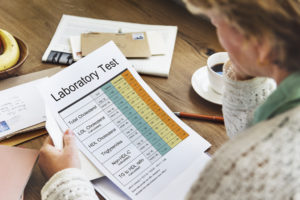
Insulin resistance often results in anxiety and depression. One study showed that it altered metabolism in mitochondria. The scientists found that mitochondria increased the production of two enzymes that degraded dopamine. So dopamine was metabolized faster and didn’t last as long in the brain. Resulting in anxiety and depression.[xiii]
We know that insulin helps control levels of blood sugar by helping cells to take in sugar through cellular membranes. And insulin secretion is regulated by hormones in the hypothalamus region of your brain.
Researchers are just recently discovering that specific insulin receptors in regions of the brain have different affects. For example, insulin receptors in the hippocampus are involved in learning and memory.
The many ways that insulin can affect cognition are just being discovered. And I’ll write about these discoveries as they happen in future posts here on Nootropics Expert.
For now, I highly recommend you get your fasting insulin checked if you’re serious about brain optimization. Find a good naturopathic doctor to help you interpret the results. And provide recommendations on how to reverse insulin resistance.
To start, you can add Ashwagandha, Berberine, and Magnesium to your nootropic stack to help lower blood sugar levels, and insulin resistance.
IGF-1 (insulin-like growth factor)
Insulin-like growth factors (IGF-1 and IGF-2) are proteins and their receptors are part of a complex system used to help cells in the central nervous system communicate.
IGF-1 are involved in neuron survival, neurogenesis, excitatory and inhibitory neurotransmission, regulation of food intake and cognition. Recent research has found a link between brain insulin/IGF-1 and certain neurodegenerative diseases including Alzheimer’s.[xiv]
You can increase Insulin-like growth factor (IGF-1) by adding Acetyl-L-Carnitine (ALCAR) and Pterostilbene to your nootropic stack.[xv]
Thyroid (TSH, T4, T3 and free T3)
Thyroid stimulating hormone (TSH) is secreted by your pituitary gland which controls thyroid hormone secretion by your thyroid. Your thyroid then releases thyroxine (T4) and triiodothyronine (T3, free).
Iodine is the essential trace element that combines with the amino acid tyrosine to form thyroid hormones T4 and T3. Thyroxine (T4) contains four iodine atoms, and triiodothyronine (T3) contains three iodine atoms.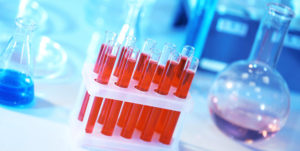
The problem is unless you have symptoms for hypo– or hyperthyroidism, it’s unlikely that your doctor will order a thyroid panel for you. Unless you ask them specifically.
Most doctors are trained and don’t know any better than to simply order a TSH blood test. Measuring TSH is not a reliable way to assess the health of your thyroid.
Why is this important? You could be dealing with thyroid problems and not be aware of it until symptoms get severe. In my case, I ended up in the ER with what I thought was a heart attack. Turns out I was hypothyroid.
Thyroid problems can be caused by a host of things. But the most common is an Iodine deficiency. Insufficient iodine is not only a problem in developing countries. Studies have found this holds even in Western countries; iodine deficiency has become a critical health problem world-wide.[xvi]
This is especially critical for anyone working on optimizing your brain. Within your brain, T4 is converted to T3 by selenium which then affects gene expression controlling metabolism within cells. And activates the catecholamines dopamine, norepinephrine and epinephrine.
A malfunctioning thyroid caused by iodine deficiency results in brain fog, poor cognition, difficulty learning, problems with recall, depression and anxiety. All symptoms I personally experienced until I got my thyroid levels back in line.
It would take pages to explain the importance of correctly reading a Thyroid Panel. If you have a feeling for any reason that you could have thyroid issues, I highly recommend Janie Bowthorpe’s book “Stop The Thyroid Madness” (Amazon).
As a neurohacker, you have several options for maintaining thyroid health. By far the easiest thing you can do is add Iodine to your nootropic stack.
Other Blood & Lab Tests
Labs for testosterone, estradiol and other sex hormones in men, and testosterone and estrogen in women are also important to check. And all have an influence to varying degrees on cognitive function.
Low testosterone in men and women for example can have a profound effect on anxiety, depression, and memory.[xvii] While nootropics cannot directly raise levels of things like testosterone, you need to be aware of their importance for brain optimization. And see a hormone-replacement specialist if you suspect or know you are low in either hormone.
Get more detail on how sex hormones affect your brain in this article: Sex Hormones and Your Brain
Reading Lab Results
Traditionally trained doctors accept imbalances in many key blood tests as part of natural aging. Their only concern is when your result may be outside of the normal lab “reference range”.
The problem with this normal reference range is that they are based on ‘average’ populations. Rather than optimal levels we need to maintain good health and for brain optimization these levels only tell you that you are alive.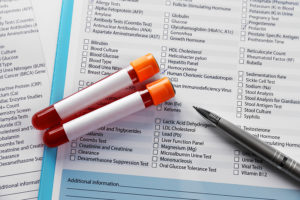
A perfect example of this is for men who typically suffer with excess production of insulin and estrogen. Along with simultaneous deficiencies in testosterone and DHEA. And this is happening to younger and younger men.
If your regular doctor used the standard “reference range” and your labs came back at the low end of the standard range. You would not feel well. But your doctor would declare nothing wrong with you.
The same thing is happening to both men and women with thyroid testing. A recent study at Stobhill Hospital in Glasgow found that patients who were hypothyroid were considered within “normal” TSH reference ranges. But they were “psychologically impaired”.[xviii]
I learned this through much trial an error, a few years of feeling like crap, firing no less than six endocrinologists and a few doctors. This led me to doing my own research and learning how to read my own lab results.
I encourage you to do the same. Find out exactly what is going on in your body and brain with the tools you have available to you.
Learn to read your own labs. Because if you don’t know what to do with your results, then what good is the test? Keep at it until you achieve the results you want. I did. And this is the best I’ve felt in many years. You can too.
I highly recommend Lets Get Checked for many of the labs I detailed above. You order online, they’ll send you a kit with instructions, and once returned to their lab you’ll get your results in 2 – 3 weeks. Try: Lets Get Checked and use coupon code: nootropics20 for 20% off.

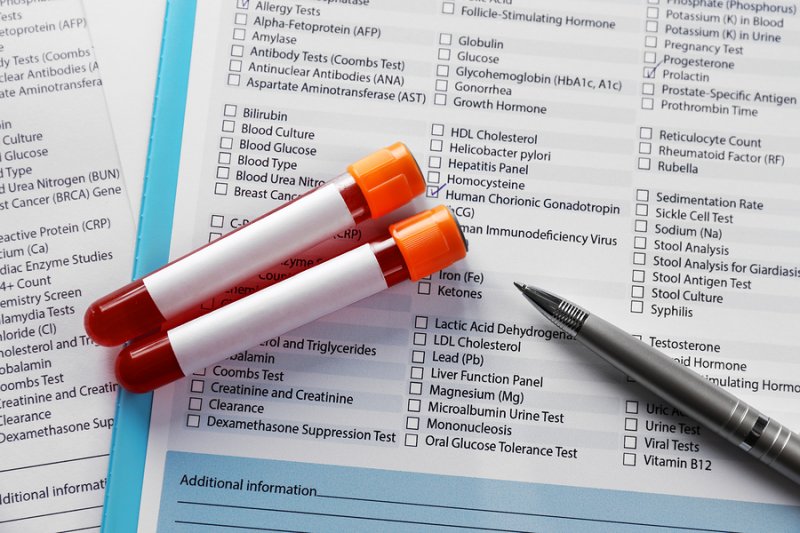
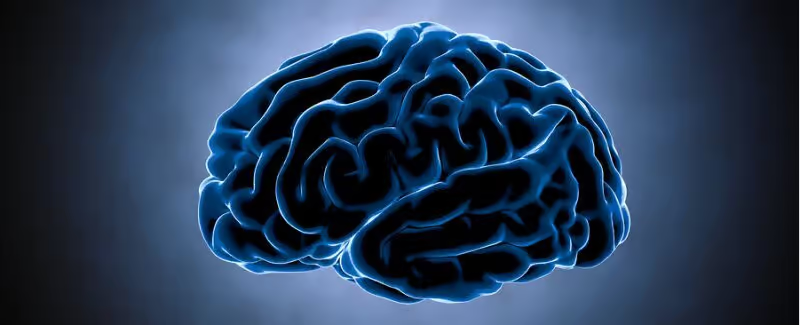





Join The Discussion - 17 comments
Mek
September 1, 2024
Please note in your article that LetsGetChecked is unavailable in Europe.
I have seen time and time again that I was “in the reference range” and doctors told me “there is nothing wrong exactly like you’ve written. My homocysteine was 15 and the reference range max value was 15. So if I had 16 then it would already be wrong? Needless to say that homocysteine is not a regular blood work test and you have to demand and pay for it yourself. These doctors – total amateurs. I took B6, B9, B12 and in a few months my homocysteine was 11. But I was still not feeling well, so I continued testing.
Many tests are not available here where I live (Slovakia).
I have come across youtube videos of other naturopaths, who say that serum tests are useless to check your long-term nutritional status. Because serum tests only reflect what you have eaten yesterday. To check long-term status, you should use intracellular tests. I haven’t found a lab that would offer such kind of testing. What’s your opinion?
Also, I did an extended panel of tests, and it surprised me that serum glucose and insulin were both in range, but HOMA-IR (which is an index that is calculated from these two) was way above reference range 0-2.5. My value was 3.11. What I found out is that it indicates serious insulin resistance. When I get all my results, I am going to ask my GP about this, but what is your take on this regarding to nootropics? If my GP says I am really insulin resistant, I would like to use some nootropics to resolve this.
David Tomen
September 3, 2024
Mek, first, I am not a doctor and haven’t trained as a doctor. My expertise comes from thousands of hours of studying neuroscience and practical experience with nootropic supplements.
No test exists as far as I know that tells you the nutrient level within cells. And you are correct that blood tests only measure what is currently in your blood. But if your doctor tells you that you are insulin resistant like my naturopath did several years ago then start using 500 mg Berberine 3-times per day. That is what I did and am no longer insulin resistant.
Mek
September 6, 2024
David, was Berberine enough in your case or did you have to change your diet and lifestyle too?
It’s hard to believe that berberine would be the one “magic pill” for this problem 🙂 And I don’t think my diet and lifestyle is such a mess today…
David Tomen
September 7, 2024
Mek, I cleaned up my diet before that. But I still eat relatively normally. I just avoid processed food as much as possible. Berberine has been proven in clinical studies to be as effective as Metformin and that has been my experience as well.
Mek
September 7, 2024
That’s what I will do as well. Thank you 🙂
Ryan Smith
March 20, 2023
Thank you for this great resource.
I am dealing with some health issues and with the help of your website I am hoping to get to the bottom of it.
I plan on pushing my doctor to get all these test.
I was curious if you would recommend any other resources based on my symptoms?
I have been having a lot of muscle twitches, primary in my legs and upper right eyelid, but also throughout the rest of my body
Brain fog
At times dizziness
At times depression and irritability
Eye issues (focusing and reading when looking at a computer screen)
Thank you
David Tomen
March 20, 2023
Ryan what you are describing could be something as simple as a magnesium deficiency. My suggestion is get the labs done as soon as you can. But start today with 4 capsules of a high quality magnesium supplement before bed like this one: https://bit.ly/3Z33cwv
Marco
June 29, 2022
Hi David! how could I know if I’m overmethylator? Should I care?
David Tomen
July 1, 2022
Marco, the symptoms of an over-methylator can include anxiety, depression, paranoia, a racing mind, low motivation and panic attacks. Not a great life experience.
Alexa
April 16, 2022
Greetings David!
My CRP is perfectly fine, should I check TNF-a, IL-6, IL-1b and IL-8 then?
David Tomen
April 18, 2022
Alexa, I think it would be a good idea to get the proinflammatory cytokines checked even if your CRP levels are fine.
Adda barry
September 22, 2021
Hi there thank you so much for all of this advise. I suppose I just wanted confirmation that mind lab pro is 100% legit prior to purchasing for my 18yr old son who has add. Terrified of messing with his head even more !!!!
David Tomen
September 22, 2021
Adda, Mind Lab Pro is legit. It is used by tens of thousands around the world and has been for many years. It is pure with zero “other ingredients” and uses patented ingredients to ensure quality. I’ve been using it daily for the last 5 years and it is my favorite pre-made nootropic stack.
Bob Dee
September 16, 2021
Amazing David, I would sure love to hear what you think of Self Decode? I think others might appreciate that as well.
All the best always too for what you continue to do for all of us!
David Tomen
September 20, 2021
Bob, I think Self Decode is a great service for anyone interested in learning more about their genetic makeup. They compliment what I’m doing with Nootropics Expert.
Kong
July 15, 2019
Hi
I am considering of taking a lab test . As you mention does the below stated sufficient enough for the blood test. Have I miss out any details. Thanks
C-Reactive Protein (CRP)
(TNF-a),
interleukin-1 beta (IL-1b),
interleukin-6 (IL-6), interleukin-8 (IL-8
hormones T4 and T3.
CBC Panel (Chemistry & Complete Blood Count)
DHEA
Estradiol
Homocysteine
Folate and Vitamin B12
Fasting insulin
(IGF-1 and IGF-2)
occludin and zonulin
David Tomen
July 15, 2019
Kong, that pretty much covers it. But for thyroid get “free T4” and “free T3” instead.